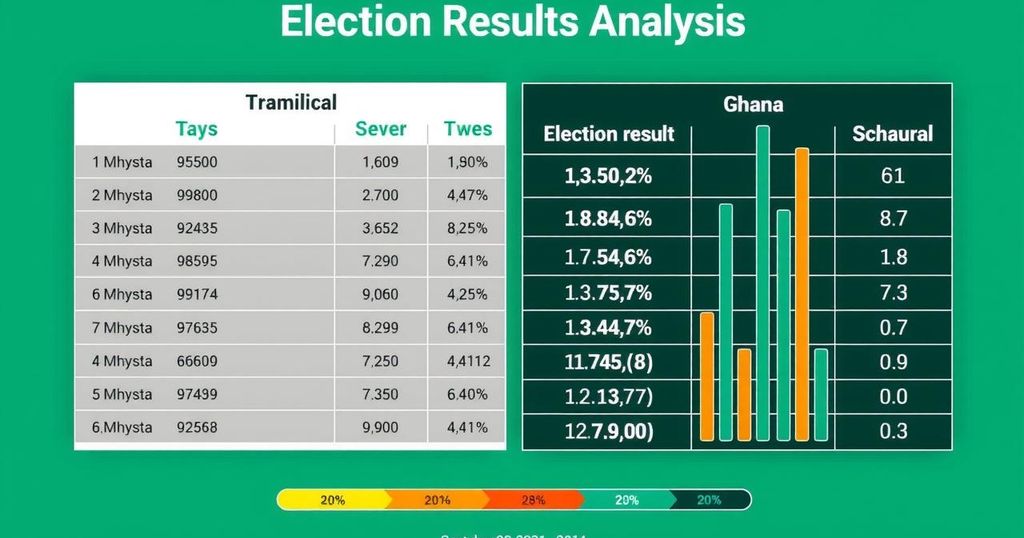Ghana’s 2024 Election Results: A Shift in Political Power from NPP to NDC
The 2024 Ghanaian elections marked a significant shift as the ruling NPP lost to the opposition NDC, following eight years in power plagued by economic crisis and public dissatisfaction. Voter sentiments were heavily influenced by issues such as inflation and unemployment, leading to a decisive rejection of the incumbent government’s strategies. This trend reflects a broader regional pattern of electoral changes amid economic challenges in several African nations.
This year’s election in Ghana marked a significant political shift, as the ruling New Patriotic Party (NPP) was ousted by the opposition National Democratic Congress (NDC) after a challenging eight years in power. This political transition follows a historical trend, as no party has been able to maintain power for more than eight years within the country since the inception of democratic elections in 1992. The public dissatisfaction stemmed primarily from economic hardships exacerbated by inflation, unemployment, and a perceived lack of effective governance.
The NPP’s campaign, which centered around the slogan “break the eight,” aimed to create history by securing a third consecutive term in office. However, the opposition capitalized on voter frustration regarding economic management, high living costs, and unemployment rates. Economic researcher Mussa Dankwah highlighted that “the state of the economy caused the NPP government to lose this election,” reflecting widespread public sentiment.
Despite the NPP government’s focus on initiatives such as free senior high school education and digitalization, these efforts failed to address urgent economic concerns. With inflation peaking in 2023 at around 54%, many citizens struggled with the cost of basic necessities. The government’s commitment to solve these issues did not resonate with voters facing dire living conditions, leading to a significant shift among the electorate.
The election results revealed that the NPP lost crucial parliamentary seats, with major opposition wins across swing regions, including Greater Accra and Western regions. Data from pre-election surveys suggested that dissatisfaction with the NPP’s governance contributed to voters favoring John Mahama of the NDC, who performed significantly well among first-time voters. The results indicated a clear rejection of the current administration, demonstrated by losses in traditionally supportive regions for the NPP.
The NPP’s retreat from power aligns with a broader trend across Africa, where ruling parties have also faced electoral defeats amidst economic turmoil and mounting public discontent over governance issues. The backdrop of corruption, ill-managed economic policies, and ineffective strategies to combat unemployment culminated in this electoral outcome. Overall, this election serves as a pivotal moment in Ghana’s democratic journey, signifying the electorate’s demand for accountability and effective governance moving forward.
The recent electoral results in Ghana signal a pivotal transition in the political landscape, as the ruling New Patriotic Party (NPP) lost the 2024 elections to the opposition National Democratic Congress (NDC). This change marks a significant historical pattern in Ghana’s democracy, where no political party has maintained power beyond eight years since the inception of the fourth republic in 1992. Economic challenges, particularly high inflation, rising unemployment, and widespread public dissatisfaction with governance, contributed to this electoral outcome. The NPP’s attempts to secure a historic third consecutive term were unsuccessful amid mounting criticism regarding the management of the economy and living conditions.
The results of the 2024 Ghanaian elections highlight a critical shift in the political dynamics of the country, fueled by widespread economic discontent and demands for effective governance. The NDC’s victory illustrates the electorate’s desire for change following years of perceived mismanagement by the NPP. As Ghana faces ongoing economic challenges, these election results may prompt urgent government introspection and reform efforts to meet the expectations of its citizens.
Original Source: www.bbc.com




Post Comment